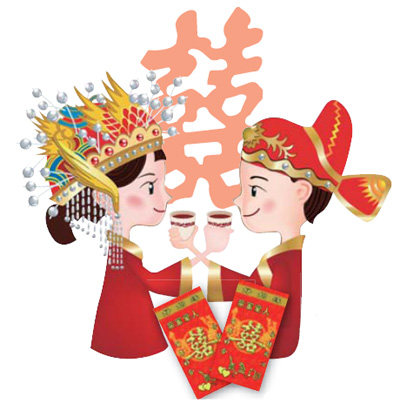


Claire Wang and Todd Feng invited nearly 130 guests, including relatives, to their marriage ceremony, which was held recently at a posh club in Beijing. Besides traditional gifts of jewelry, bedding and artwork, they received around 110,000 yuan in hard cash.
"This can not only cover the marriage expenses but also, to some extent, subsidize our honeymoon," Wang, the bride, said. She pointed out that the money came from friends and younger invitees, while higher value gifts mainly came from older relatives.
"I really love hard cash," said Wang, 27. "While we are grateful to those guests who gave us tangible gifts, these are not as essential to our lives now as much as money is."
That sentiment seems increasingly to prevail among China's newly-weds these days, and cash, gifted inside a red envelope, or hongbao, has become the preferred wedding gift across the country.
Gifts of tangible possessions that were traditionally given at weddings are now losing their luster, due mainly to the new economic reality in China.
Wang illustrated that with an example. Her mother was married in 1979 and at the time of the wedding, the gifts included six sets of dishware, eight sets of bedding, three radios, several cookers and washbasins, as well as some plastic flowers.
Relatives and friends had pooled money (coufenzi in Chinese) to buy all these things, Wang's mother, a retired middle school teacher now in her 50s, told her.
"We did not buy kitchen utensils, bedding and washbasins for nearly 10 years after the marriage," she told her daughter, Wang recalled.
"During those days, China still had a planned economy, and thus danwei, the institutions or companies people worked for, provided various kinds of welfare services, the most conspicuous being the house in which you lived," said Chen Xinxin, researcher at the Chinese Academy of Marriage and Family, which is affiliated to the All-China Women's Federation.
Wang's mother told her that she had started staying in an apartment allotted by her husband's danwei - a research institute under the Tsinghua University - and that they used to get even towels, soaps and detergents every month from the institution during the 1980s. "We also received rice, flour, cooking oil and eggs during festivals," Wang recalled her mother telling her.
"But Wang's generation, which grew up in a market economy, has to strive for everything - from a house to a car, from daily necessities to consumer durables. This heavy financial burden drives them to be practical," Chen pointed out.
Eric Lu, a friend of Feng's, sent a 1,000-yuan hongbao to the couple, thinking that hard cash was more convenient and practical. "I was not sure what they needed the most and had no time to choose a wedding gift," said the 32-year-old engineer working for a foreign IT company.
The busy lives people lead these days is also forcing many guests to choose the easiest and most pragmatic way to express their love for the couple, which is, by gifting money, Chen said.
An online poll conducted recently by tom.com showed that in major cities such as Beijing, Guangzhou and Shanghai, people gave a hongbao of between 200 yuan and 800 yuan. Shanghai was the most generous, as the minimum hongbao that was given was 500 yuan. The survey covered over 2,000 netizens.
The survey also found that monetary gifts in second-tier cities such as Nanjing, Dalian and Xi'an, were higher than in key cities, with the highest hongbao being 1,000 yuan.
The survey explained that people in those cities were likely to be natives, while major cities had a significantly higher migrant populations, offering the wedding hongbao was a kind of exchange activity. "They know that if they give more, they would receive more," the report summarized.
Tangible gifts are still popular in China's rural areas, but traditional food and durables have given way to gifts of household electrical appliances, apparel and accessories, as well as home furnishings.
Seeing this rising trend of giving gifts of cash, Long Dunyuan, a 30-something Shanghai migrant, founded a website in 2007 to collect gift money for brides and grooms before their wedding.
If a couple registered on his website with real names and gave him a wedding invitation list, he would ask invitees to offer monetary gifts in advance, so that the couple could use the funds to plan for the ceremony and honeymoon.
Another business model Long developed was extending loans to brides and grooms-to-be. Instead of offering them hard cash, he led the couples to his contracted wedding service companies and provided services on loan. Then he inspired guests to hand over monetary instead of material gifts during the wedding. After the wedding, Long repaid wedding companies with money from the hongbao and charged 1 percent as his fee.
But Long had to shut the website last year as it came under suspicion for illegal fund raising
"My income was decent at that time and I had contracted over 60 wedding service providers," said Long. He noted that he would stick to the initiative, and said he was trying to find a way out of the legal issue.
Researcher Chen pointed out that, although giving money or hongbao directly was no longer an embarrassing thing for either couples or invitees these days, some etiquette needed to be carefully maintained.
"You must put your name on the red envelope or insert a card into it. This will help the brides and grooms know who had gifted them money, as wedding ceremonies are usually busy and jumbled," she said.
(China Daily 06/08/2009 page1)













